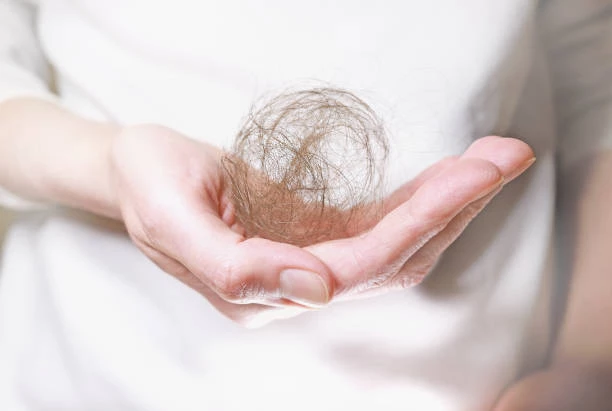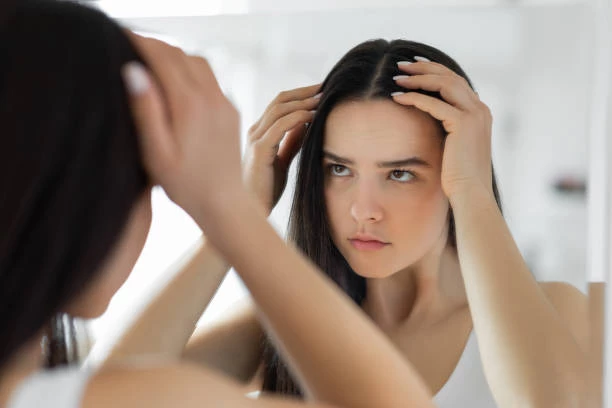I. Introduction
Falling Hair Treatment at Home: Delving into Effective Remedies for Hair Loss Hair loss, a concern shared by many, often prompts exploration into effective remedies. Amidst various approaches, home treatments stand out for their accessibility and convenience. Understanding the nuances of falling hair treatment at home becomes pivotal in addressing this widespread issue.
II. Understanding Hair Loss

Hair loss isn’t a singular condition; it manifests in diverse forms and stems from various causes.
A. Types of Hair Loss
Androgenetic Alopecia (Male and Female Pattern Baldness)
Among the most common, this genetic predisposition results in hair thinning and eventual loss. It varies between genders, presenting as receding hairlines in men and diffuse thinning in women.
Telogen Effluvium
Typically triggered by severe stress, illness, or hormonal imbalances, this condition prompts a sudden shedding of hair, often several months after the triggering event.
Alopecia Areata
An autoimmune condition called Alopecia Areata occurs when the immune system attacks hair follicles, causing unpredictable bald spots.
B. Common Causes of Hair Loss
Understanding the underlying causes aids in tailoring effective treatments.
Genetics
Hereditary factors significantly contribute to hair loss patterns. Identifying familial predispositions can offer insights into potential hair loss concerns.
Hormonal Imbalance
Fluctuations in hormonal levels, particularly dihydrotestosterone (DHT) and estrogen, can disrupt the hair growth cycle, leading to hair loss.
Stress
Chronic stress impacts various bodily functions, including hair health. Elevated stress levels can trigger Telogen Effluvium, disrupting the hair growth cycle.
Diet and Nutrition
Inadequate intake of essential vitamins and minerals can result in hair loss.
III. Assessing Hair Loss at Home

Recognizing signs and employing preliminary assessments play a pivotal role in determining the best course of action.
A. Identifying Signs of Hair Loss
Observable signs include increased shedding, visible thinning, receding hairlines, or bald patches. Regular scrutiny helps in early detection.
B. Self-Diagnosis Techniques
Simple tests, such as the pull test or scalp examination for inflammation or scaling, aid in gauging the severity and potential causes of hair loss.
C. When to Seek Professional Help
While initial assessments are valuable, seeking professional guidance becomes imperative when signs persist or worsen, ensuring timely and accurate treatment.
IV. Falling Hair Treatment At Home

When combating hair loss at home, various natural remedies and lifestyle adjustments can play a significant role in promoting hair health.
A. Scalp Massages and Essential Oils
Benefits of Scalp Massages
Regular scalp massages stimulate blood circulation, enhancing nutrient delivery to hair follicles. This action promotes relaxation and reduces stress, a common trigger for hair loss. Massaging the scalp with gentle pressure also helps distribute natural oils, improving hair texture and strength.
Essential Oils for Hair Growth
Essential oils like rosemary, peppermint, and lavender are renowned for their hair-strengthening properties. They stimulate hair follicles, promoting growth and thickness. Carrier oils like coconut or jojoba mixed with essential oils create potent hair treatments that nourish the scalp and encourage healthy hair growth.
B. Dietary Changes and Supplements
Essential Nutrients for Healthy Hair
Nutrients like biotin and vitamins A, C, and D. Minerals such as zinc, iron, and vitamins A and E are essential for healthy hair maintenance. Biotin, in particular, is known for its positive effects on hair strength and growth.
Foods Rich in Hair-Nourishing Nutrients
Incorporating a balanced diet rich in leafy greens, nuts, seeds, eggs, fish, and fruits ensures a sufficient intake of essential nutrients for hair health. These foods provide the necessary vitamins and minerals vital for strong, vibrant hair.
Recommended Supplements
Sometimes, dietary sources may only fulfill some nutrient requirements. If a healthcare professional recommends supplements, they can help fill the gaps in nutrient intake. Biotin supplements, for instance, are famous for supporting hair health.
C. Natural Hair Masks and Treatments
DIY Hair Masks for Strengthening and Growth
Homemade hair masks using ingredients like avocado, egg, honey, and yogurt offer nourishment, moisture, and strength to hair strands. These masks can be customized to address specific hair concerns, promoting growth and vitality.
Herbal Rinses and Treatments
Herbal rinses, such as rosemary or nettle tea rinses, can be used as final hair rinses to enhance shine and stimulate the scalp. Additionally, herbal treatments like aloe vera gel or hibiscus extracts can be applied to the scalp to nourish and soothe, aiding in hair health.
V. Lifestyle Changes for Managing Hair Loss

Incorporating certain lifestyle modifications can significantly contribute to managing and minimizing hair loss concerns.
A. Stress Management Techniques
Meditation and Relaxation Exercises
Engaging in mindfulness practices, meditation, yoga, or deep breathing exercises helps reduce stress levels. Lowering stress directly impacts hair health, minimizing the likelihood of stress-induced hair loss.
Exercise and its Impact on Hair Health
Regular physical activity boosts overall blood circulation, promoting better nutrient delivery to hair follicles. Exercise also regulates hormonal balance, contributing positively to hair growth and strength.
B. Avoiding Harmful Hair Practices
Proper Hair Care Routine
Establishing a gentle hair care routine involves:
- Use suitable shampoos and conditioners.
- Limiting heat styling.
- Avoiding harsh brushing or tight hairstyles that can stress hair strands and scalp.
Styling Techniques to Minimize Damage
Opting for hair-friendly styling techniques, like air-drying instead of heat styling, using heat protectants, and employing loose hairstyles reduces stress on the hair, preventing breakage and damage.
VI. Alternative Therapies and Home Devices

Exploring alternative treatments and home devices provides additional avenues for addressing hair loss concerns.
A. Laser Combs and Helmets
Laser devices like combs and helmets emit low-level laser therapy (LLLT) to stimulate hair follicles, promoting growth and reducing hair loss. These devices are designed for home use and can aid in improving hair density and thickness over time with consistent usage.
B. Acupuncture and Traditional Remedies
Acupuncture is a traditional Chinese medical treatment that involves inserting fine needles into specific points on the body to stimulate energy flow and promote healing. Some studies suggest it can help address hair loss by reducing stress and promoting circulation. Additionally, traditional remedies like herbal supplements or scalp massages with natural ingredients are believed to support hair health.
C. Homeopathic Treatments
Homeopathy involves using highly diluted substances to stimulate the body’s natural healing process. Homeopathic remedies for hair loss often include botanical extracts or minerals believed to support hair growth. However, the effectiveness of these treatments may vary and should be approached with caution.
VII. When to Consider Professional Help

While home treatments can be effective, there are instances where professional guidance becomes essential.
A. Signs Home Remedies Aren’t Effective
Persistent or worsening hair loss despite consistent home treatments could indicate the need for professional evaluation. Increased shedding, visible thinning, or lack of improvement are signs to consider.
B. Seeking Advice from Dermatologists or Trichologists
Consulting with specialists like dermatologists or trichologists can provide tailored guidance. These professionals can perform thorough evaluations, recommend appropriate treatments, and address specific underlying causes of hair loss.
C. Medical Treatments Available for Severe Hair Loss
In severe cases, medical interventions like prescription medications (such as minoxidil or finasteride), corticosteroid injections, or surgical procedures like hair transplants may be suggested by healthcare professionals to manage and treat hair loss effectively.
VIII. Frequently asked questions about falling hair treatment at home
1. How can I reduce my hair fall at home?
Answer: There are several ways to minimize hair fall at home. Start with a balanced diet rich in nutrients like iron, protein, and vitamins essential for hair health. Consider scalp massages with natural oils like coconut or almond oil to improve blood circulation and nourish hair follicles. Additionally, minimize heat styling, use gentle hair care products, and manage stress through relaxation techniques or exercise.
2. How can I stop my hair from shedding at home?
Answer: To reduce hair shedding, use a mild shampoo to avoid tight hairstyles and excessive brushing. Eat protein, iron, and vitamins A, C, and E.
As stated by cibdol.com, massages with essential oils like rosemary or peppermint can also strengthen hair follicles and minimize shedding.
3. How can I keep my hair from falling out?
Answer: Treating hair loss at home involves various approaches. Consider scalp treatments using natural ingredients like aloe vera or onion juice, which are believed to promote hair growth. Adopt a nutrient-rich diet and explore options such as essential oil scalp massages, homemade hair masks, or laser combs designed to stimulate hair follicles.
4. What foods stop hair fall?
Answer: Several foods support hair health and can help minimize hair fall. Include foods rich in protein, like eggs, fish, and lentils, which provide essential nutrients for hair growth. Additionally, consume fruits and vegetables high in vitamins A, C, and E, along with nuts and seeds containing omega-3 fatty acids that nourish hair follicles and promote healthy hair growth.
5. Can home remedies help with hair fall?
Answer: Yes, several home remedies like scalp massages with essential oils, homemade hair masks using natural ingredients, and dietary changes rich in hair-nourishing nutrients can aid in managing hair fall. Consistent application and a holistic approach are crucial to seeing results.
6. Are there any specific vitamins that can prevent hair fall?
Answer: Vitamins such as biotin (B7), vitamin D, vitamin E, and vitamin A are known to promote hair health and reduce hair fall. Biotin supports hair growth, while vitamins D, E, and A contribute to scalp health and hair follicle strength.
7. How effective are natural hair masks in reducing hair fall?
Answer: Natural hair masks made with ingredients like avocado, honey, yogurt, or aloe vera are known for their nourishing and strengthening properties. When used regularly, these masks can improve hair health, minimize breakage, and reduce hair fall.
8. Is stress a significant factor in hair fall, and how can I manage it at home?
Answer: Yes, stress can contribute to hair fall. Managing anxiety at home involves adopting relaxation techniques like meditation, yoga, or deep breathing exercises. Regular exercise, sufficient sleep, and a balanced lifestyle also play vital roles in stress management, indirectly impacting hair health positively.
IX. Conclusion Regarding Falling Hair Treatment At Home
Concluding the discussion on falling hair treatment at home entails summarizing key points and providing encouragement for a holistic approach to hair health.
A. Recap of Home Treatments for Hair Loss
From scalp massages to dietary changes and alternative therapies, a myriad of home-based remedies offer avenues for tackling hair loss naturally.
B. Encouragement for Consistency and Patience
Consistency in adopting these treatments and lifestyle changes is crucial. Results may only appear after some time, emphasizing the importance of patience and persistence.
C. Final Thoughts and Encouragement
Understanding the complexity of hair loss and the range of treatment options available empowers individuals to take proactive steps toward maintaining healthy hair. Embrace a multifaceted approach and seek professional guidance when needed, ensuring the best possible care for your hair.
Read also.. Understanding Hair Loss: Causes, Impacts, and Comprehensive Treatment Strategies


[…] like saw palmetto, ginseng, and biotin are believed to support hair health and may help slow down hair loss associated with a receding […]